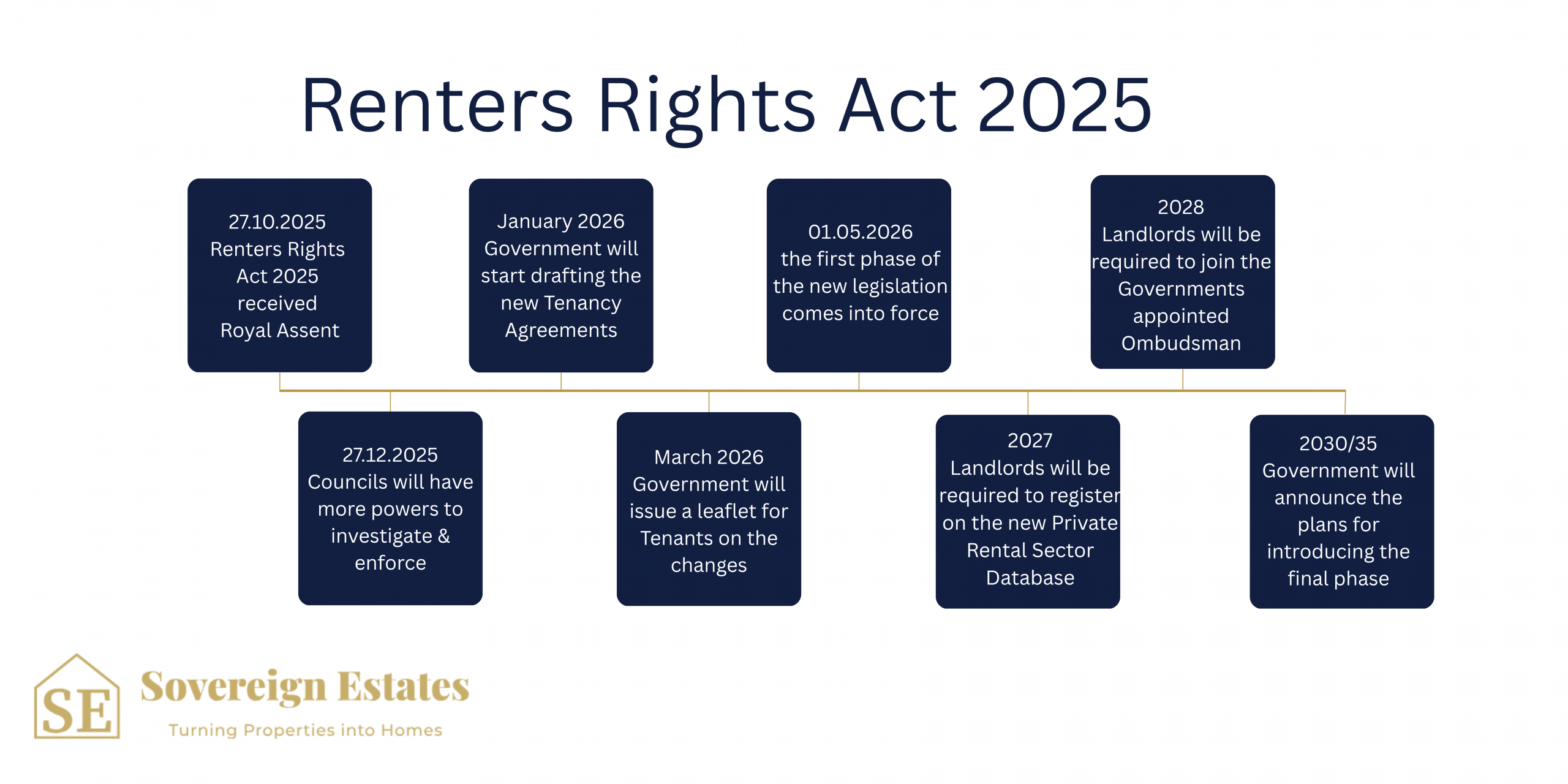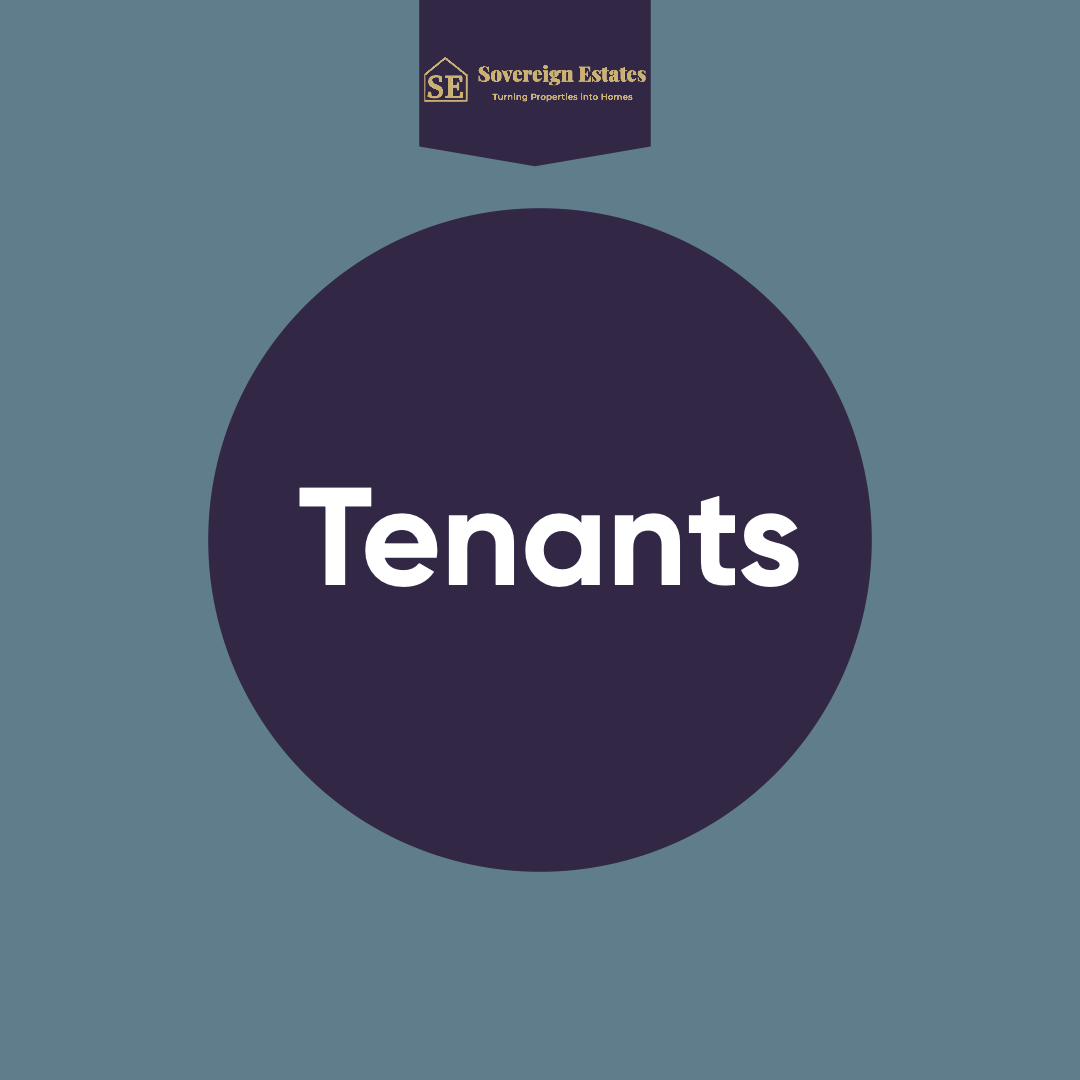Renters Rights Act 2025
An update on where The Renters Rights Bill is currently as of 20.11.2025
The Renters Rights Act 2025 became law on 27th October 2025 with the changes to be implemented in stages. Below is a guide to the information we currently know and the timeframe as it currently stands.

Trusted Experts Dedicated to Your Property Success
Meet the skilled professionals driving Sovereign Estates’ personalised service.

1st May 2026
The first major phase of the new legislation comes into effect on 01.05.2026 to include:
- Abolishment of Section 21 notice
- Abolishment of Fixed Term Tenancies
- Abolishment of Rent paid in advance exceeding one month
- Abolishment of Discrimination
- Abolishment of rental bidding
- Rent can only be increase in line with market value once a year via a Section 13 notice
- Taking Pet requests into consideration

2027
In 2027 Landlords will be required to register themselves and their properties on the Private Rental Sector database which will be introduced by the Government. Failure to comply will bring with it fines and sanctions. If the Landlord and Property isn’t registered then it cannot be rented.

2028
In 2028 Landlords will be required to register with the Governments appointment Ombudsman. Failure to comply will bring with it fines and sanctions. If the Landlord and Property isn’t registered then it cannot be rented.

2030-35
The final phase of the legislation changes will take place in this period and will include the following:
- Decent Homes Standard update
- Homes Health & Safety Rating System (HHSRS) update
- Awaabs Law will be introduced
- Energy Performance Certificate (EPC) minimum rating for rental properties will be amended to a C rating.

Abolition of Section 21 “No Fault” Evictions
Section 21 is abolished. All evictions will use revised Section 8 grounds, with a 12-month protected period at the start of a tenancy for move-in/sale grounds and four months’ notice when those grounds are used.
New ground 4a is specific to student HMOs. Only applies to tenancy agreements with full-time students which are entered into less than six months before the move-in date. The landlords must give four months’ notice (which must expire between 1 June and 30 September), and they must intend to re-let to full-time students.

Renting with Pets
Landlords must not unreasonably refuse a request to keep a pet and must respond to requests within 28 days. The UK Government has promised to issue guidance on what is considered reasonable, but it is expected that type of pet and property size can be taken into account, along with head leases.

New Decent Homes Standard (DHS)
A new DHS will be introduced for the Private Rental Sector, setting minimum standards for housing quality.

Single System of Periodic Tenancies
All assured tenancies move to a single periodic model, called ‘section 4a assured periodic tenancies’ in the legislation. Tenancy periods will be the same duration as the period the rent is paid for; in most cases, this will be monthly (which is also the maximum rent period allowed), but rolling weekly tenancies are also possible. There will be no minimum or fixed tenancy term. Tenants can leave with two months’ notice from day one of the tenancy.

Limit on Rent in Advance
Upfront rent requests are capped at one month (or 28 days) before a tenancy starts; terms requiring advance payments during the tenancy are unenforceable and now deemed illegal. A tenant can offer rent in advance but this cannot be under duress.

Private Rented Sector Landlord Ombudsman
A new ombudsman will be established to resolve disputes between Landlords and Tenants in England.

Enhanced Tenant Protection
The bill aims to give greater rights and protections to renters, including making it illegal for Landlords to discriminate against prospective Tenants based on benefits or children, and ensuring Landlords address hazards like damp and mould within a specific time.
Measures tackle overt and indirect discrimination against benefit recipients and people with children.

Procedure for Rent Increases
Landlords will only be able to increase rents once a year by following the Section 13 procedure. Tenants retain the right to challenge increases at the First-tier tribunal, which can reduce the rent if it is above market value, and can delay the effective date of an increase if it will cause undue hardship.

Private Rented Sector Database
All Landlords will be required to register themselves and their properties on a Private Rented Sector Database.
Impact on Landlords & Tenants

Landlords
The changes will require Landlords to adapt to a new system of Periodic Tenancies and to ensure their properties meet the new Decent Homes Standard.

Tenants
The changes are expected to provide greater security and stability for Tenants, with the abolition of “no-fault” evictions and the introduction of a single system of Periodic Tenancies.

